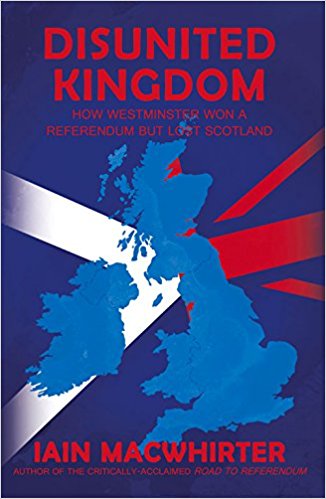Book Preview: Disunited Kingdom: Iain Macwhirter 
Please buy the book!
How Westminster won a Referendum but lost Scotland. It was a grey dawn that broke over Holyrood on the morning of 19th September 2014. Yes campaigners trooped in the rain to Edinburgh’s Dynamic Earth exhibition centre for what many had hoped and believed would be a victory celebration. It felt more like a wake. Alex Salmond put on his brave face and declared that the referendum result was a triumph for democracy that vindicated the decision to call it in the first place. It seemed as if the Union had won a convincing victory. This was the first occasion on which Scots had been given a democratic choice on whether or not to remain in the Union, and they’d voted to remain. But there can be little doubt that Salmond’s counterintuitive celebrations were largely justified. Scotland really had “changed, changed utterly” as he put it in his resignation speech. To the immense frustration of the victorious unionists campaign, the losers seemed to win it all. You could not escape the referendum effect – it was everywhere: in town halls, pubs, clubs, dinner tables and of course on the streets. An unprecedented 97% of Scots registered to vote and 85% actually turned out on the day – the highest turnout since the achievement of adult universal suffrage in Britain. It was probably the most intense period of earnest political disputation in 100 if not 300 years. It marked the beginning of the end of the Union of 1707, the consolidation of a distinct Scottish political culture, the end of Labour’s political dominance of Scotland. 1.6 million Scots voted Yes after a campaign in which independence was portrayed as tantamount to economic suicide. Whole sections of Scottish society, mainly but not exclusively working class, were persuaded for the first time that voting actually mattered. The tsunami general election of May 2015 saw 56 independence-supporting MPs out of 59 elected to the House of Commons, after the most dramatic general election swing – averaging 30% – in Scottish or UK history. Better Together began with a commanding lead of 70% to 30% – yet it all but evaporated. The membership of the Scottish National Party more than quadrupled. Nicola Sturgeon became the Peoples’ Champion, addressing stadium sized audiences across Scotland. Scottish nationalism became the new normal in areas like Glasgow which had been Labour strongholds for a century. It also marked the decline of the conventional UK media as a shaper of mass political opinion. Everything changed even though, paradoxically, things remained outwardly the same. Scots remain citizens of the United Kingdom and Westminster retains ultimate sovereignty over legislative affairs. Scotland’s MPs are not engaged today in complex negotiations over separation: bargaining Trident against debt, carving up the BBC, dividing military assets. An independent Scotland is not knocking on the door of the European Union; the Bank of England is not trying to calm febrile financial markets; the Queen is not insisting that Britain still remains a going concern. But this is only the shallow surface of continuity. What is beyond doubt is that there can be no going back to the old, somnolent, apathetic, Westminster-dominated Scotland. Whether the constitution recognises it or not, Scotland is now becoming an independent country. The book covers
- The Devil you know – the currency debate
- Art and Politics – Referendum TV, National Collective, Writers, the fall of the BBC
- Mainstream media – the Sunday Herald and the Partisan Press, Social media and BBC-bashing
- The two faces of Nationalism – progressive and xenophobic
- The Constitution – the death of the Union, federalism
- Alex Salmond’s Dream and Nicola’s coronation
- The permanent Referendum – political activism and the end of the UK
Yes Edinburgh West has a website, Facebook, Twitter, National Yes Registry and a Library of topics on Scottish Politics, including Independence.



